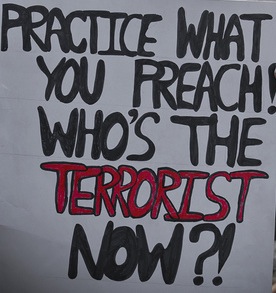“Canada will not tolerate the abuse of the Immigration system by terrorist elements escaping Sri Lanka.” — former minister of immigration Jason Kenney
In 2009, I was among thousands of Toronto’s Tamil community that protested against the war in Sri Lanka. We braved the bitter cold and formed human chains across downtown to desperately turn people’s attention to the carnage of chemical weapons unleashed on our families and communities.
While most Torontonians celebrated Mother’s Day, we occupied the Gardiner Expressway when over a thousand civilians were killed in 24 hours.
Despite months of protest and direct lobbying, the Harper government refused to condemn the Sri Lankan atrocities. In the Conservative caucus it was business as usual in the midst of genocide.
Two years later a UN report vindicated our protests and accused the Sri Lankan Armed Forces of killing 45,000-75,000 civilians from January to May 2009. The report shed light on the Sri Lankan armed forces indiscriminate shelling of hospitals, churches, temples, food distribution lines and even government declared “no fire zones.”
Fast forward to the fall of 2013. The prime minister announces that he will boycott this weekend’s Commonwealth meeting to be hosted by Sri Lanka in light of the country’s human rights abuses.
Analysts suggest that Harper’s boycott is really about courting the concentrated votes of Toronto’s 300,000 strong Tamil community in the next federal election.
Of course, Sri Lanka’s treatment of the Tamil people — characterized by occupation, dispossession and continued violence — warrants international isolation. However, by contrast, the Harper government’s treatment of 492 Tamil refugees onboard the MV Sun Sea raises a troubling inconsistency in the prime minister’s commitment to human rights.
Harper’s past treatment of Tamil refugees reveals inconsistencies with present speak
In 2006 the Conservative government outlawed the Liberation Tigers of Tamil Eelam (LTTE), an organization that fought for Tamil self-determination, and put the group on its terrorist list.
With the imminent arrival of the MV Sun Sea in the summer of 2010, the Conservatives effectively used anti-terrorism legislation to attach the “Tamil Tiger terrorist” label to the refugees onboard by virtue of their ethnicity alone.
Former minister of public safety Vic Towes held a bizarre dockside press conference to tell Canadians that the refugees, including the elderly and children, were LTTE members involved in a human smuggling conspiracy. Over 100 refugees from the MV Sun Sea have since been deported back to Sri Lanka where they risk torture, rape and death.
These refugees onboard fled genocide only to be welcomed with detainment and deportation.
The Human Rights Watch report We Will Teach You a Lesson affirms that Tamils suspected of LTTE membership are systematically tortured and raped in Sri Lankan prisons. The Harper government has legal obligations under international treaties like the Convention relating to the Status of Refugees and the Convention against Torture, which protect refugees from deportation to countries where they will be tortured.
Talk is cheap when we’re dealing with human rights issues
A real commitment to human rights protection in Sri Lanka requires recognition of the nature of Tamil oppression. After all, why would 492 people pack onto a relatively small cargo ship to risk dehydration and hypothermia?
Decades of land seizures, unequal access to resources, embargoes on food and medical supplies, and recent revelations of forced birth control all amount to a slow genocide of the Tamil people.
Today, while Tamils are still denied the right to return to their homes under military occupation, the Sri Lankan government claims that reconciliation is its primary focus.
In fact, Jason Kenney visited Sri Lanka earlier this year and declared that Canada had “boosted its international efforts to prevent human smuggling” and “no planned smuggling voyages have succeeded in getting to Canada.”
If the prime minister’s boycott is to amount to something more than an election strategy, the government must match its rhetoric with real protections for refugees fleeing genocide.
Krisna Saravanamuttu is an activist based in Toronto and is a member of the steering committee of the Canadian Peace Alliance. Krisna is completing a three-year term on the board of the National Council of Canadian Tamils. He is involved with the Coalition for Tamil Rights. Follow him on Twitter: @KrisnaS85



